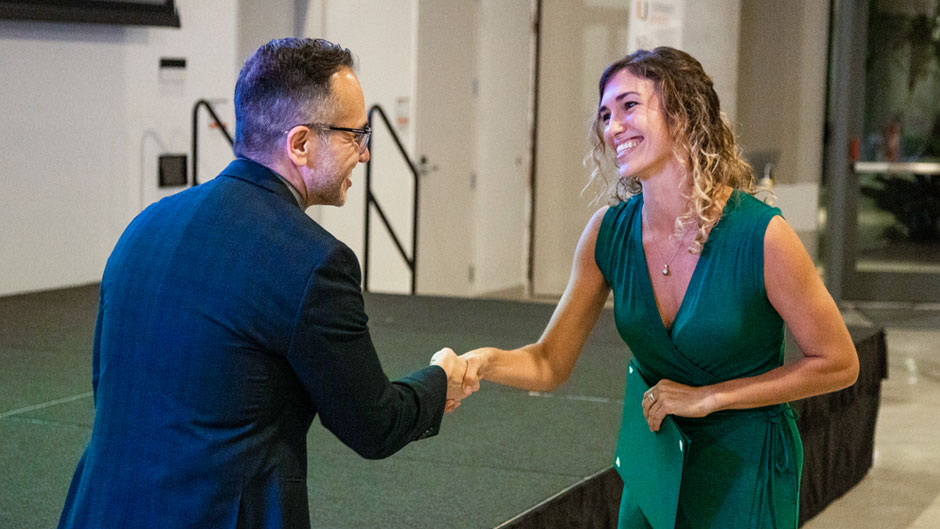Ten audacious students put their research communication skills to the ultimate test at the sixth annual Three Minute Thesis Competition, an event presented by the University of Miami Graduate School in partnership with the Graduate Student Association.
Given just three minutes, each competitor presented condensed versions of their scientific research with only one PowerPoint slide displayed behind them as a visual aid. Competitors pitched their work to an audience and panel of judges including Jeffrey Duerk, executive vice president for academic affairs and provost; Rodolphe el-Khoury, dean of the School of Architecture; Kelly Miller, associate dean of learning and research services at the University of Miami Libraries; and Devang Desai, president of the Alumni Association and member of the Board of Trustees.
Guillermo “Willy” Prado, vice provost for faculty affairs and dean of the Graduate School, was also in attendance at the Thursday evening event that returned to an in-person format after being presented virtually last year.
Liv Williamson, doctoral student in marine biology and ecology at the Rosenstiel School of Marine and Atmospheric Science, won first place and the people’s choice award at the annual competition for her presentation, “Testing Strategies to Enhance Climate Resilience in Caribbean Coral Juveniles for Reef Restoration.”
“As a person who likes animals and nature, I think I was drawn to coral reefs because they are so beautiful and because they are so urgently threatened by climate change. We kind of say they are the canaries in the coal mine,” said Williamson, whose advisor is Andrew Baker, associate professor of marine biology and ecology.
Williamson’s research focuses on testing approaches to enhance the stress tolerance of juvenile corals in order to assist future generations of corals withstand climate change and warming oceans. Not only is she enthusiastic about saving coral reefs but alongside this work, she is interested in making marine science research comprehensible for the masses.
“I’m the outreach coordinator for my lab and I do a lot of talks and tours for the public and just try to say things about marine science that are understandable and digestible to the public,” said Williamson. “I thought this would be a great way to practice that formally and succinctly. It was a challenge.”
Joan Brown, a master’s degree student in global health and society, was the runner-up of the competition. Her research was titled, “Ethnicity Has No Effect on the Mortality of Prostate Cancer in Black Men Living in Broward County Florida.” This project is near and dear to Brown’s heart.
“My husband is a soccer player, and he is 60 years old,” she explained. “All his friends are getting prostate cancer. In my family alone, like seven men were diagnosed with prostate cancer. So, I knew that this was something that I could do to make a positive impact on my community.”
Brown’s topic explores the effect of ethnicity on the incidence of prostate cancer in men of African ancestry living in Broward County, Florida.
“I did the competition because I wanted my research to be explained clearly and concisely, so that I can reach as many people as possible,” said Brown, who is hoping her research will open doors for other researchers to better understand why this health disparity exists and is so poorly understood.
Without incident and in stride, the other eight students in the competition successfully showcased and presented their research in a unique and original way. The Graduate School team, judges, and spectators commended each participant during the networking reception following the competition.
The Three Minute Thesis Competition is an internationally recognized event designed to hone graduate students’ critical thinking and communications skills for a broad audience.
Williamson was awarded prizes of $750 and $350 for the first place and people's choice award, respectively, and Brown took home $350 as the second-place winner. To learn more about the competitors’ research and the annual competition, visit the Graduate School’s website.
